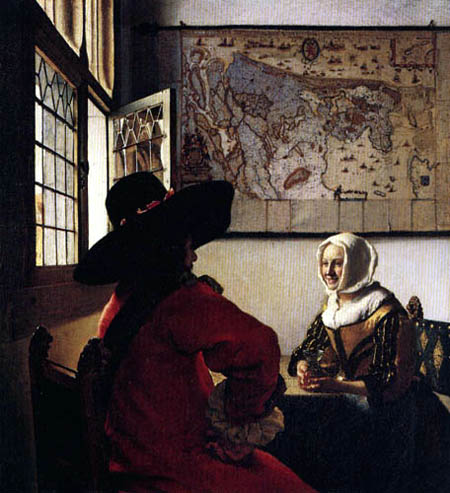
* Johannes Vermeer, Officer and the Laughing Girl (The unconventionality of this painting lies in how the viewers can only get a partial view of the man, who is suggestively in depth conversation with the smiling woman. The window is ajar while lights flood in the room, encroaching unto everything except the viewable part of the man's face. Whoever is trying to surmise the man's facial expressions will remain a doubtless fool.)
What makes a good story sound if the world is already packed with sounds? He seats her cosily in a room robbed of all possible noises, except the regular pendulum-swings of the man, who promises the girl to tell the tale no sooner. The tale unfolds and speeds faster than the gusts lilting on the man's tongue, spanning widely from the child who was lost from the rose that ailed. An excellent tale needn't veer too far from its quotidian matter to make it exciting. The man has traveled far enough to dismiss the chimerical account of amusements, for every knowledgeable people will know the most abnormal incident spawns from the no anomaly. On a balmy day like this I used to hear a woman cry, yet no matter how painstakingly I hunted down the sound the woman was ever-invisible to me.
You can feel how the building now trembles along with my every syllable, the every sound. The stories awaken them and they reverberate in assent, in expectation. My lady, do sit down and dispel your ghastliness, and listen to the proceedings: the man was once imprisoned on an island, less sadly though he was attended by a hoary old man, who in return asked for the man’s undoubting devotion in reading, eternally reading to the old man, until the land was no longer compliant and he lost his name. Died a posthumous artist the man’s family chalked on his grave.
The map on the wall wrinkles an edge in response to the man’s tale. The island was then vanished from the map, marked merely by its story that afloats upon and sways into the horizon of ocean. They will wait until the hubbub settles outside of unknown reasons, when the rare silence returns he will whisper to her ear, to beg her stay and be his prisoner, for ever is a story untold or unfinished, and the story craves for the fidelity of a good listener. The man forbids the woman from going, the besieging walls, as well, makes her escape futile.
Comments
Post a Comment